Cannes Film Festival: the best is yet to come
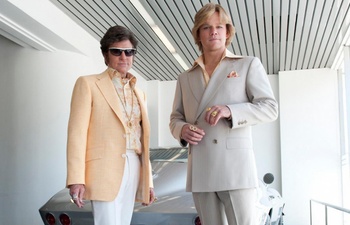
(Behind the Candelabra)
Why is even your otherwise so Brussels-centric AGENDA covering the Cannes Film Festival? Simple. Of all the best films that will be released here over the coming year, half are given their world première on the Côte d’Azur. And that’s a modest estimate. The 66th edition will be a battle between Roman Polanski, Steven Soderbergh, Joel & Ethan Coen, François Ozon, Hirokazu Kore-eda, and Asghar Farhadi.
Where to look first? That question might drive you crazy at Cannes. At the massive throng, straining to catch a glimpse of the film stars ascending the red-draped stairs in outfits that the specialist press and fashion bloggers will discuss as though they were world news? At the many women who want to look like those film stars, but don’t have the money and/or the good taste? At all the extra zeros on your restaurant bill? At the street artists, the luxury yachts, the muscle-bound bouncers threatening party crashers? At the gigantic billboards with ads for blockbusters? The stunt of an attention grabber trying to get ahead of the one hundred other attention grabbers that day? As a film journalist, you can enjoy the great benefit of being able to ignore the whole circus (not entirely, but largely). But even when you only concentrate on the films, it is impossible to know where to look first.
Stars ’n stripes
Naturally, the festival competition attracts most attention. Twenty films are in the running for the Golden Palm. The verdict will be decided by a jury chaired by the blockbuster king (but also born storyteller and film virtuoso) Steven Spielberg. This year features quite a number of big names. Although No Country for Old Men shamefully went home empty-handed in 2007, the Coen brothers are back this year. Inside Llewyn Davis is a period drama about the life of a young musician who gets into the folk scenes in Greenwich Village, New York in the early 1960s, but then discovers a guitar won’t protect him from the cold.
Why is even your otherwise so Brussels-centric AGENDA covering the Cannes Film Festival? Simple. Of all the best films that will be released here over the coming year, half are given their world première on the Côte d’Azur. And that’s a modest estimate. The 66th edition will be a battle between Roman Polanski, Steven Soderbergh, Joel & Ethan Coen, François Ozon, Hirokazu Kore-eda, and Asghar Farhadi.
Where to look first? That question might drive you crazy at Cannes. At the massive throng, straining to catch a glimpse of the film stars ascending the red-draped stairs in outfits that the specialist press and fashion bloggers will discuss as though they were world news? At the many women who want to look like those film stars, but don’t have the money and/or the good taste? At all the extra zeros on your restaurant bill? At the street artists, the luxury yachts, the muscle-bound bouncers threatening party crashers? At the gigantic billboards with ads for blockbusters? The stunt of an attention grabber trying to get ahead of the one hundred other attention grabbers that day? As a film journalist, you can enjoy the great benefit of being able to ignore the whole circus (not entirely, but largely). But even when you only concentrate on the films, it is impossible to know where to look first.
Stars ’n stripes
Naturally, the festival competition attracts most attention. Twenty films are in the running for the Golden Palm. The verdict will be decided by a jury chaired by the blockbuster king (but also born storyteller and film virtuoso) Steven Spielberg. This year features quite a number of big names. Although No Country for Old Men shamefully went home empty-handed in 2007, the Coen brothers are back this year. Inside Llewyn Davis is a period drama about the life of a young musician who gets into the folk scenes in Greenwich Village, New York in the early 1960s, but then discovers a guitar won’t protect him from the cold.
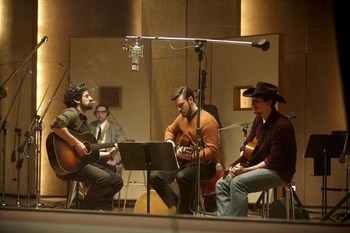
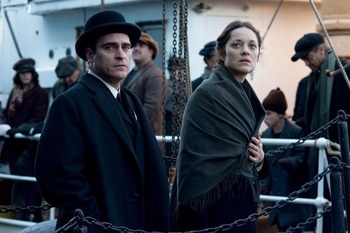
(Inside Llewyn Davis / The Immigrant)
Steven Soderbergh is making an attempt to come full circle. In 1989, his debut Sex, Lies, and Videotape snatched the top prize. Behind the Candelabra, a film commissioned by the American premium network HBO, will apparently be his last. It is a portrait of Liberace, a virtuoso pianist who predated Elton John, Madonna, and Lady Gaga.
If we could pick one last American, it wouldn’t be Jim Jarmusch (Broken Flowers) or Alexander Payne (About Schmidt) but James Gray. In The Immigrant, the concoctor of dark tragedy who made Two Lovers and We Own the Night zooms in on the tragic fate of a Polish immigrant (Marion Cotillard) who is struggling to survive in New York in 1921.
Bleu, blanc, rouge
Competing with the Americans are a surprising number of French people and foreigners who make French films. By François Ozon – this is only his second go in the competitive section – is Jeune et jolie: the portrait of a 17-year-old girl of the night in four seasons and four songs.
Steven Soderbergh is making an attempt to come full circle. In 1989, his debut Sex, Lies, and Videotape snatched the top prize. Behind the Candelabra, a film commissioned by the American premium network HBO, will apparently be his last. It is a portrait of Liberace, a virtuoso pianist who predated Elton John, Madonna, and Lady Gaga.
If we could pick one last American, it wouldn’t be Jim Jarmusch (Broken Flowers) or Alexander Payne (About Schmidt) but James Gray. In The Immigrant, the concoctor of dark tragedy who made Two Lovers and We Own the Night zooms in on the tragic fate of a Polish immigrant (Marion Cotillard) who is struggling to survive in New York in 1921.
Bleu, blanc, rouge
Competing with the Americans are a surprising number of French people and foreigners who make French films. By François Ozon – this is only his second go in the competitive section – is Jeune et jolie: the portrait of a 17-year-old girl of the night in four seasons and four songs.
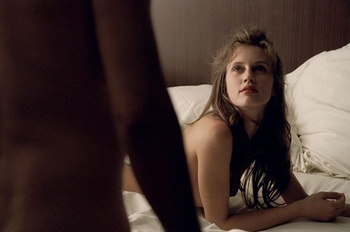
(Jeune et jolie)
Abdellatif Kechiche is presenting La vie d’Adèle: the story of a fifteen-year-old girl whose view of herself and the world changes radically when she falls in love with Emma (Léa Seydoux). Kechiche’s earlier films include the masterful La graine et le mulet (2007).
The soon to be 80-year-old Roman Polanski asked his wife Emmanuelle Seigner to play an actress willing to do anything, and who enchants a theatre director from Paris in La Vénus à la fourrure.
Arnaud Desplechin is always present, except when the awards are being handed out. He is trying his luck for the fifth time with Jimmy P. (Psychotherapy of a Plains Indian). Benicio Del Toro plays a shell-shocked Blackfoot Indian returning from the Second World War, while Mathieu Amalric plays his French psychoanalyst.
What about the rest of the world?
Desplechin made his film in English. The Iranian Asghar Farhadi, on the other hand, made his film in Paris. Le passé is a film that easily withstands comparison to his Oscar- and Golden Bear-winning A Separation.
Abdellatif Kechiche is presenting La vie d’Adèle: the story of a fifteen-year-old girl whose view of herself and the world changes radically when she falls in love with Emma (Léa Seydoux). Kechiche’s earlier films include the masterful La graine et le mulet (2007).
The soon to be 80-year-old Roman Polanski asked his wife Emmanuelle Seigner to play an actress willing to do anything, and who enchants a theatre director from Paris in La Vénus à la fourrure.
Arnaud Desplechin is always present, except when the awards are being handed out. He is trying his luck for the fifth time with Jimmy P. (Psychotherapy of a Plains Indian). Benicio Del Toro plays a shell-shocked Blackfoot Indian returning from the Second World War, while Mathieu Amalric plays his French psychoanalyst.
What about the rest of the world?
Desplechin made his film in English. The Iranian Asghar Farhadi, on the other hand, made his film in Paris. Le passé is a film that easily withstands comparison to his Oscar- and Golden Bear-winning A Separation.
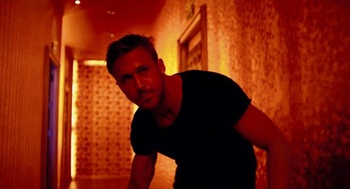
(Only God Forgives)
Japan’s honour is being defended by the highly prolific cult director Takashi Miike (13 Assassins) and our personal favourite Hirokazu Kore-eda (Nobody Knows, Still Walking). Denmark is counting on Nicolas Winding Refn and Only God Forgives. He is following Drive with more Ryan Gosling, even more stylisation, and even more violence. And we’ve saved the best news for last. The festival has a fine tradition of selecting films that aren’t particularly eye-catching but often outclass the work of bigger names.
Pretenders to the Throne
The competition is only the cream of the crop. Seven films are being presented out of competition, including a new documentary by Claude Lanzmann (Shoah). In addition, there are seven séances spéciales, including a documentary by Stephen Frears about boxer Muhammad Ali’s refusal to fight in Vietnam. Many women have been relegated to the side-line section Un Certain Regard. Claire Denis with Les salauds, for example, or Sofia Coppola with a film about teenagers who break into the Beverly Hills villas of Hollywood’s finest: The Bling Ring. Tore tanzt, by the German Katrin Gebbe, is about the Christian punk movement Jesus Freaks. They reject the establishment, but embrace Jesus.
Japan’s honour is being defended by the highly prolific cult director Takashi Miike (13 Assassins) and our personal favourite Hirokazu Kore-eda (Nobody Knows, Still Walking). Denmark is counting on Nicolas Winding Refn and Only God Forgives. He is following Drive with more Ryan Gosling, even more stylisation, and even more violence. And we’ve saved the best news for last. The festival has a fine tradition of selecting films that aren’t particularly eye-catching but often outclass the work of bigger names.
Pretenders to the Throne
The competition is only the cream of the crop. Seven films are being presented out of competition, including a new documentary by Claude Lanzmann (Shoah). In addition, there are seven séances spéciales, including a documentary by Stephen Frears about boxer Muhammad Ali’s refusal to fight in Vietnam. Many women have been relegated to the side-line section Un Certain Regard. Claire Denis with Les salauds, for example, or Sofia Coppola with a film about teenagers who break into the Beverly Hills villas of Hollywood’s finest: The Bling Ring. Tore tanzt, by the German Katrin Gebbe, is about the Christian punk movement Jesus Freaks. They reject the establishment, but embrace Jesus.
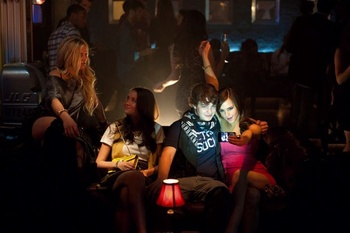
(The Bling Ring)
Two more festivals are organised parallel to the Cannes Film Festival: the Semaine de la Critique and the Quinzaine des Réalisateurs. The bar is unmistakably somewhat lower here, but there are still a few excellent films every year. Last year’s No, for example, the film starring Gael García Bernal as a hip advertising agent who came up with the campaign that brought down the Chilean dictator Pinochet in 1988. Perhaps even more importantly, they cast the spotlight on a few interesting new directors every year.
What about the Belgians?
Only one countryman presenting a feature film at Cannes this year? Belgians tend to be spoiled here. The Brussels-based actress Yolande Moreau is closing the 45th edition of the Quinzaine with her second feature film. In Henri, the Italian theatre director and rebel Pippo Delbono plays a somewhat washed up, reclusive fifty-year-old who has hit the bottle, but then meets Rosette. This slightly mentally handicapped young woman dreams of love, sex, and a normal life. Moreau’s talent as an actress (see Séraphine and Micmacs à tire-larigot), but also her skills as a director were clearly shown in Quand la mer monte... in 2005.
Two more festivals are organised parallel to the Cannes Film Festival: the Semaine de la Critique and the Quinzaine des Réalisateurs. The bar is unmistakably somewhat lower here, but there are still a few excellent films every year. Last year’s No, for example, the film starring Gael García Bernal as a hip advertising agent who came up with the campaign that brought down the Chilean dictator Pinochet in 1988. Perhaps even more importantly, they cast the spotlight on a few interesting new directors every year.
What about the Belgians?
Only one countryman presenting a feature film at Cannes this year? Belgians tend to be spoiled here. The Brussels-based actress Yolande Moreau is closing the 45th edition of the Quinzaine with her second feature film. In Henri, the Italian theatre director and rebel Pippo Delbono plays a somewhat washed up, reclusive fifty-year-old who has hit the bottle, but then meets Rosette. This slightly mentally handicapped young woman dreams of love, sex, and a normal life. Moreau’s talent as an actress (see Séraphine and Micmacs à tire-larigot), but also her skills as a director were clearly shown in Quand la mer monte... in 2005.
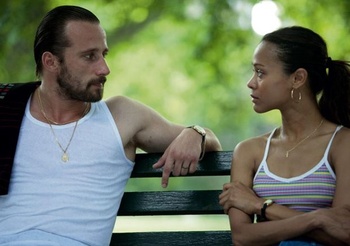
(Blood Ties)
In the short film competition, we find Sint-Lukas alumnus Gilles Coulier with Mont Blanc. And there are a few more actors here and there. Matthias Schoenaerts plays a small role in Blood Ties, an English-language thriller by Frenchman Guillaume Canet. Farhadi (Le passé) gave an important role to the young Belgian actress Pauline Burlet. Alex van Warmerdam ensured that for the first time in 38 years, The Netherlands has a chance to win the Golden Palm. The lead part in the dark story Borgman is played by a Belgian, however, Jan Bijvoet. The Golden Palm and other prizes will be presented on 26 May. Bet you the winners won’t know where to look first.
Cannes Film Festival • 15 > 26/5, www.festival-cannes.fr
In the short film competition, we find Sint-Lukas alumnus Gilles Coulier with Mont Blanc. And there are a few more actors here and there. Matthias Schoenaerts plays a small role in Blood Ties, an English-language thriller by Frenchman Guillaume Canet. Farhadi (Le passé) gave an important role to the young Belgian actress Pauline Burlet. Alex van Warmerdam ensured that for the first time in 38 years, The Netherlands has a chance to win the Golden Palm. The lead part in the dark story Borgman is played by a Belgian, however, Jan Bijvoet. The Golden Palm and other prizes will be presented on 26 May. Bet you the winners won’t know where to look first.
Cannes Film Festival • 15 > 26/5, www.festival-cannes.fr
Read more about: Film, Events & Festivals
Fijn dat je wil reageren. Wie reageert, gaat akkoord met onze huisregels. Hoe reageren via Disqus? Een woordje uitleg.